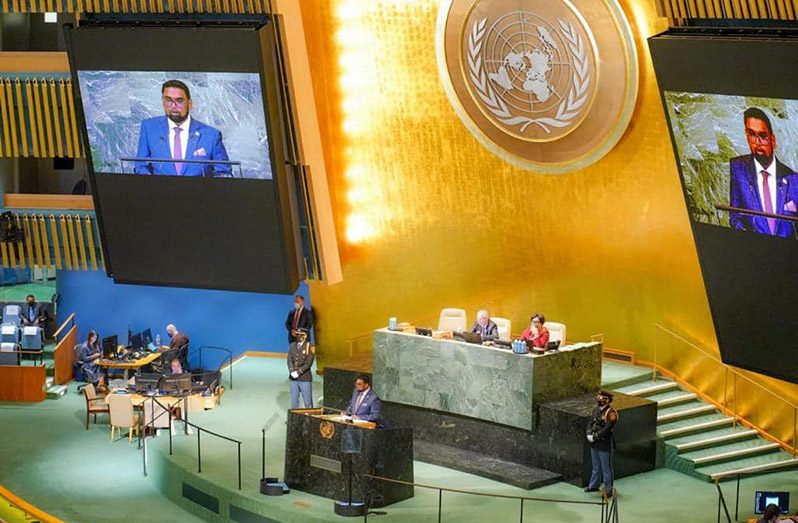–President Ali implores global leaders, says this would open fiscal space, create opportunities for economic recovery
PRESIDENT, Dr. Irfaan Ali has implored global leaders to address the financing gap between the developed world and developing countries, especially since the COVID-19 pandemic and other interlocking global challenges have widened the gap of inequality.
Dr. Ali, in his firm address to the United Nations General Assembly, said climate challenges, energy and food crises and inter-state conflicts are among the issues which have led to a loss in revenues and income in the developing world, which, in some cases, had earmarked those funds for initiatives that would help in the achievement of many Sustainable Development Goals (SDG) by 2030.
“[To address this] there must be an immediate re-examination of the financing gap and the debt portfolio of the developing countries, to open fiscal space and create an opportunity for recovery, bridging the gap and attaining the SDG goals,” President Ali related.
He went on to say: “We are living in a troubled world which has lost its balance. Indeed, our collective actions, as leaders today, will convey to the next generation that their aspirations, their future, and that of the planet are worth fighting for.”
The Head of State cited substantial sources of statistics that point to the widening gap of inequality across the world, one of which was the United Nations (UN) report published in March 2022, which addressed the unequal distribution of COVID-19 vaccines and its impact on widening the economic disparity between the rich and poor.
“The study found that low-income countries could have increased their GDP by US$16.7 billion in 2021, if they had a similar vaccination rate as high-income developed countries,” President Ali said, adding: “How are we going to address this inequality? How are we going to address this injustice?”
Those issues are compounded by the 65 per cent rise in global food prices. Food prices are expected to remain high in the medium term, as a result of supply chain constraints, a hike in energy costs, higher shipping costs, climate issues and the war in Ukraine.
“The global food security problem has disproportionately affected us. The prevalence of moderate and severe food insecurity trended upwards since 2014. The World Food Programme and FAO warned that acute food insecurity would worsen in 20 hunger hotspots from June – September 2022,” President Ali said.
Further, the President said, the onset of the Russia-Ukraine war saw global food prices reaching an all-time high in February 2022.
The global food import bill for this year has been recorded so far at US$1.8 trillion, a new record according to the FAO. This is a steep increase by US$51 billion from 2021, $49 billion of which reflects higher prices.
WHAT ARE WE DOING?
“The question is what we are doing about this?” the President questioned, noting: “Can the reversal of export bans on rice and wheat and freeing up of grains, help this situation? The answer is a resounding yes. For example, export bans of rice from India and wheat from Russia contributed to a price increase of 12.3 per cent and nine per cent for rice and wheat respectively.”
Geared at controlling its prices, India banned exports of broken rice and instituted a 20 per cent export tax on several varieties of rice commencing September 9. With India being the largest exporter of rice, this has had ripple effects across the world. Similarly, following the war between Russia and Ukraine, since earlier this year, Russia has instituted temporary bans on exports of its grains to particular countries.
Several nations have also imposed restrictive export measures on food and fertilisers.
“As world leaders, we must find the balance now,” President Dr. Ali remarked.
Restrictions on food commodities follow similar situations that played out earlier during the distribution of COVID-19 vaccination, which left many small nations, particularly those in the Caribbean region, at a severe disadvantage.
The President highlighted that much of the impacts are disproportionately felt by women and children.
Given the prevailing situation’s role in widening inequality and creating social and economic problems, President Ali called for a collective commitment to promote peace, stability, respect for territorial integrity and democracy, and the human rights of all.
“Now is the time for us to decide if a new approach is needed to guarantee food security, access to health care and quality education, and security from conflict and wars,” the President said.
Sharing the Guyana experience, President Ali said his government is committed to addressing issues of food security, climate change, energy security and inequalities, both within the country and in the wider Caribbean.
“We are on a path to reduce Guyana’s food import bill and increase food security- through increased cultivation and investments in new technology and smart agriculture to position Guyana as a leading food producer in CARICOM. We have also been providing incentives, capital, land and opportunities for youth and women to participate in the agriculture transformation,” Dr. Ali said.
On the issue of climate crisis, the President noted that financing and implementation are still far behind where they should be for mitigation and adaptation measures.
“In 2019, US$79.6 billion was allocated to developing nations for planning and carrying out mitigation and adaptation measures. The gap between predicted adaptation costs and existing public adaptation finance flows is generally growing and ranges from five to ten times more,” the President remarked.
“Analysis shows that the costs of adaptation are most likely to be higher than the predicted range of US$140 billion–US$300 billion annually by 2030 and US$280 billion – US$500 billion annually by 2050 for developing nations,” Dr. Ali said.
The President reminded that forested countries like Guyana are ripe with potential to earn billions of dollars through the voluntary carbon markets; however, there is need for adjustment of the current approximate price from US$10 per tonne to US$70 per tonne.












